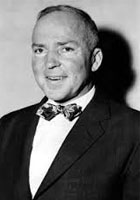Richard Eberhart
Richard Eberhart Poems
I
The spider expects the cold of winter.
When the shadows fall in long Autumn
He congeals in a nest of paper, prepares
...
My death was arranged by special plans in Heaven
And only occasioned comment by ten persons in Adams, Massachusetts.
The best thing ever said about me
Was that I was deft at specifying trump.
...
Is made up of reservoirs,
Birds flying South, mailmen
Snow falling or rain falling,
...
In June, amid the golden fields,
I saw a groundhog lying dead.
Dead lay he; my senses shook,
And mind outshot our naked frailty.
...
You would think the fury of aerial bombardment
Would rouse God to relent; the infinite spaces
Are still silent. He looks on shock-pried faces.
History, even, does not know what is meant.
...
I stood out in the open cold
To see the essence of the eclipse
Which was its perfect darkness.
...
Richard Eberhart Biography
Richard Ghormley Eberhart (April 5, 1904 – June 9, 2005) was an American poet who published more than a dozen books of poetry and approximately twenty works in total. He won the Pulitzer Prize for Poetry for Selected Poems, 1930–1965 and the 1977 National Book Award for Poetry for Collected Poems, 1930–1976. Eberhart was born in 1904 in Austin, a small city in southeast Minnesota. He grew up on a 40 acres (16 ha) estate called Burr Oaks, since partitioned into hundreds of residential lots. He published a volume of poetry called Burr Oaks in 1947, and many of his poems reflect his youth in rural America. Eberhart began college at the University of Minnesota, but following his mother's death from cancer in 1921—the event that prompted him to begin writing poetry—he transferred to Dartmouth College. After graduation he worked as a ship's hand, among other jobs, then studied at St. John's College, Cambridge, where I.A. Richards encouraged him to continue writing poetry, and where he took a further degree. After serving as private tutor to the son of King Prajadhipok of Siam in 1931–1932, Eberhart pursued graduate study for a year at Harvard University. His first book of poetry A Bravery of Earth was published in London in 1930. It reflected his experiences in Cambridge and his experience as a ship's hand. Reading the Spirit published in 1937 contains one of his best known poems "The Groundhog". He taught for eight years at the St. Mark's School (1933–1941), where Robert Lowell was one of his students. In 1941 he married Helen Butcher. They had two children.)
The Best Poem Of Richard Eberhart
The Spider
I
The spider expects the cold of winter.
When the shadows fall in long Autumn
He congeals in a nest of paper, prepares
The least and minimal existence,
Obedient to nature. No other course
Is his; no other availed him when
In high summer he spun and furled
The gaudy catches. I am that spider,
Caught in nature, summer and winter.
You are the symbol of the seasons too.
II
Now to expatiate and temporize
This artful brag. I never saw so quieting
A sight as the dawn, dew-clenched foot-
Wide web hung on summer barn-eaves, spangled.
It moves to zephyrs that is tough as steel.
I never saw so finely-legged a creature
Walk so accurate a stretch as he,
Proud, capable, patient, confident.
To the eye he gave close penetration
Into real myth, the myth of you, of me.
III
Yet, by moving eyesight off from this
There is another dimension. Near the barn,
Down meadow to shingle, no place for spiders,
The sea in large blue breathes in brainstorm tides,
Pirates itself away to ancient Spain,
Pirouettes past Purgatory to Paradise.
Do I feed deeper on a spider,
A close-hauled view upon windless meaning,
Or deeper a day or dance or doom bestride
On ocean's long reach, on parables of God?
Richard Eberhart Comments
Greetings, I am tasked with finding poems from our past NH Poet Laureates (like Kumin, Hall, Kenyon, Eberhart, etc)) who are deceased. I know their names, but need to find their poems either in the public domain or how out how to get permission to use their poems in our PSNH journal. Know how to proceed? Who to ask? Can you advise me? Thank you. BB
Morning: I am a new member. I am trying to find the full text of this Eberhart Poem with the following 'stanza': 'If I could only live at the pitch that is near madness when everything is as it was in my childhood violent, vivid, and of infinite possibility.' - Richard Eberhart Any help or direction would be appreciated. I remain, Adam Yours for a free society

Wonderful if forgotten poet!